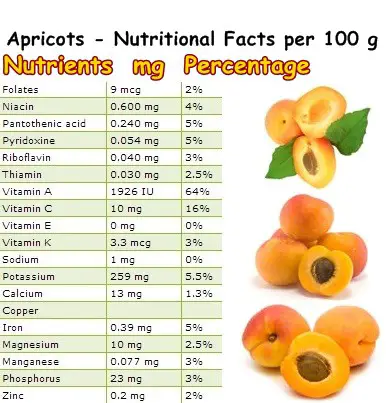Believed to have originated in ancient Asia, apricot trees (Prunus armeniaca) are cultivated intensively throughout the world. Since their domestication, their fruits have been highly appreciated, not only for their culinary value, but also for their incredible curative properties which ancient traditional medicinal systems believed were worthy of all of our attention. Ancient Persian and Greek physicians used apricot seeds and oil to reduce inflammation and even to treat tumors, among other therapeutic uses.
Apricots and amygdalin (vitamin B17)
Modern medicine has delved into the health-promoting properties of apricots and, following intensive research, has revealed the nutritional and therapeutic potential of the fruits as well as potential health risks. Amygdalin, also called laetrile, a compound occurring naturally in apricot seed kernels as well as peaches and plum kernels and bitter almonds, has been intensely promoted as vitamin B17, an anticancer nutrient. However, the compound is not a vitamin, nor an effective cancer treatment, but a highly toxic agent. Eating large amounts of apricot kernels, peach or plum or bitter almonds can be fatal.

What do apricots look and taste like?
Apricots are available all summer long, starting with mid-June, with some varieties ripening as late as autumn. The fruits are easily recognized by their bright yellow-orange skin with irregular, smudgy red tinges of color on the parts most exposed to sunlight. Depending on the variety, the flesh of apricots may range from sweet to tart and the skin from smooth to velvety. The smell of the fresh fruit is downright incredible and its fragrance easily recognizable.
As with all fruits, it is wholeheartedly recommended to eat apricots fresh, whilst in season, preferably from local, organic agriculture. Not only will you get energized and enjoy a sweet, refreshing, fragrant, but healthy snack, but you will also add to your nutrition for better overall health thanks to the generous vitamin, mineral and antioxidant content of the fruit.
What are the benefits of Apricots?
First of all, apricots are a good source of vitamin C, an incredibly potent antioxidant and anti-inflammatory. Vitamin C helps boost our immune system, offering us better protection against infectious agents. Alongside excellent amounts of vitamin A, apricots contain beta-carotene, lutein and zeaxanthin (precursors of vitamin A), all of which ensure a perfectly healthy vision. Lutein and zeaxanthin are natural carotenoids with potent antioxidant properties which protect the retina against the damaging effects of free radicals from light.

The degenerative effects of free radicals result in oxidative stress which, in time, causes cataracts or damage to the blood supply to the eyes, which eventually leads to macular degeneration (loss of central vision). A study conducted on 50,000 participants arrived at the following conclusions: female participants who took vitamin A supplements or increased their vitamin A intake through diet showed a 40% lower risk of developing cataract.
So remember: apricots make healthy eyes.
Other vitamins found in apricots include: B-group vitamins (thiamine, riboflavin, niacin, pantothenic acid, vitamin B6, vitamin B9 or folate) and vitamin K. B-group vitamins ensure the proper distribution of energy throughout the body, while vitamin K is essential for blood coagulation. Though found in small amounts only, minerals are also present in apricots: potassium, magnesium, manganese, iron and zinc are a small, yet precious addition to our diet and boast wonderful tonic and restorative properties.

Potassium regulates blood pressure and heart rate, lowering high blood pressure numbers and preventing arrhythmia, extrasystoles and palpitations. Magnesium in apricots, although a limited amount, regulates calcium absorption and contributes to strong, healthy bones and teeth as well as the prevention of osteoporosis and arthritis. Manganese is a potent antioxidant, zinc is good for immunity, while iron combats anemia and associated symptoms such as fatigue and muscle weakness.
In addition to a variety of essential vitamins and minerals, apricots also contain trace amounts of tryptophan. Studies show that tryptophan regulates serotonin levels, which not only improves mood, but can also help with sleep quality, improving disturbed sleep conditions such as insomnia.
Last but not least, apricots are a relatively good source of dietary fiber (approximately 2 g of fiber/100 g of fruit), which is ideal for anyone struggling to manage and relieve constipation. A diet rich in fiber is a great way to lose some extra pounds that just won’t come off and maintain a healthy, steady weight. If apricots are no longer in season or if you feel like trying a slightly different texture, you can switch to dried apricots, which are not only delicious, but also a source of excellent nutrition.
Fresh vs dried apricots
Dried apricots concentrate greater amounts of essential vitamins, minerals and antioxidants compared to fresh ones as a result of their reduction in water content. This nutritional aspect alone recommends them for consumption. However, they may contain sulfur dioxide, E220, a compound used to prolong shelf life of dried fruits and enhance their color (dried apricots are a beautiful, bright orange color).
But sulfur dioxide can cause allergic reactions, despite its antimicrobial properties and needs to be avoided by anyone allergic to it. If you want or need to avoid sulfur dioxide, go for the less attractive, brownish dried apricots, but read the label to be sure. Whether fresh or dried, apricots are so incredibly good for our health and a source of several wonderful benefits.
